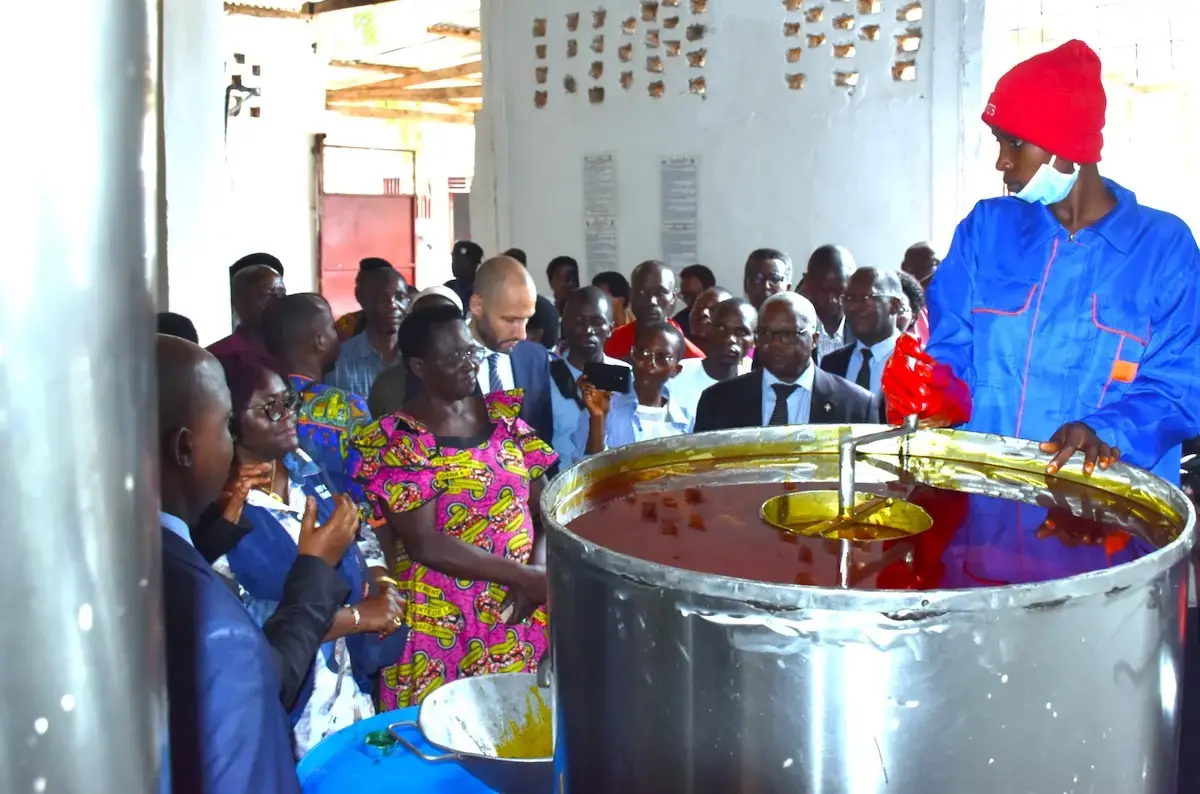KARONDA, July 29, 2025 – – In Burindi’s Karonda Province, beneath the towering palms, a quiet transformation is taking root. What began as a modest broom-making venture has blossomed into a thriving semi-industrial palm oil enterprise, driven almost entirely by women, and delivering both economic and social dividends to the community.
The Dukundane Cooperative, now producing palm oil under the Tamura Oil brand, stands as a powerful testament to the potential of women-led innovation. Since its founding in 2014, following leadership training through the Women’s Peace and Humanitarian Fund [WPHF], the cooperative has evolved from making palm fibre brooms to extracting high-quality palm oil and producing soap and organic fertiliser.
“We thank all our partners who made it possible to establish this semi-industrial unit capable of producing refined oil that can compete in the market,” said Frida Ndagijimana, President of the cooperative, which today boasts 185 members, 175 of them women.
The transformation began in earnest in 2018 when 175 local women peacebuilders—known as Abakanguriramahoro or “women mediators”—received financial support from the WPHF under its peacebuilding and socio-economic recovery programme. These women were already active in community dialogue and conflict prevention.
With a grant of US$ 180,000, the group adopted a holistic model of palm tree valorisation—extracting oil, creating soap from palm nuts, and turning processing residues into organic fertiliser. However, technical and equipment limitations meant the cooperative could not yet reach its full potential.
That changed in 2025, when additional support from the UN Peacebuilding Fund and UN Women, along with the implementing partner FVS “Amie des Enfants”, enabled the cooperative to scale up operations. Backed by a 603 million Burundian franc investment, a modern semi-industrial processing facility was built, equipped with machinery such as a steriliser, oil press, decanters, steam boilers, and kneaders.
Today, the cooperative processes 10,000 kilograms of palm bunches daily, yielding between 2,500 and 3,000 litres of Tamura Oil, a product that has rapidly gained recognition for its quality and sustainability.
“This is not just about oil; it’s about dignity, opportunity, and peace,” said Marie Claire Ndayishimiye, a founding member of the cooperative. “We are showing that women can lead, produce, and heal communities at the same time.”
Beyond oil, the cooperative now cultivates over two hectares of oil palm plantations, and the facility includes infrastructure such as sorting and storage sheds, staff changing rooms, and office space.
With support from national technical bodies, such as the National Centre for Food Technology [CNTA], the Burundi Bureau of Standards [BBN], and the Palm Oil Office [OHP], and collaboration with CREOP-JEUNES, Dukundane has become a national model for grassroots economic development and women’s empowerment.
The success of Tamura Oil also carries broader implications. It exemplifies the impact of UN Security Council Resolution 1325, which affirms the vital role of women in peacebuilding and recovery efforts. In Karonda, this resolution is not just a policy, it is a lived reality.
“We are no longer just peacebuilders, we are entrepreneurs, leaders, and providers,” said Ndagijimana. “Tamura Oil is our pride, and our symbol of hope.”
As demand for Tamura Oil grows, so too does the ambition of the women behind it. What was once a small act of survival has now become a thriving beacon of peace, resilience, and economic self-reliance, one litre at a time.
https://thecooperator.news/kilak-farmers-cooperative-society-to-explore-burundian-market/
Buy your copy of thecooperator magazine from one of our country-wide vending points or an e-copy on emag.thecooperator.news
